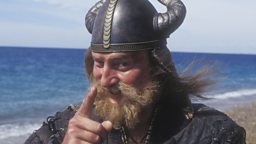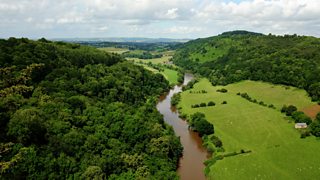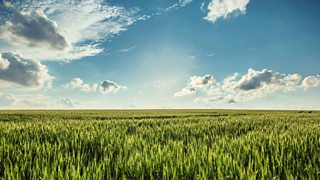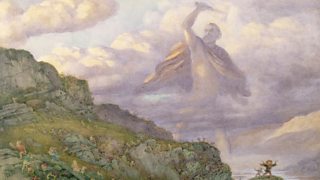Ways you talk like a Viking every day
These seafaring Scandinavian invaders brought us the words knife, gun, slaughter, ransack and anger. But then they settled, using their anger, verbs and great hair to transform our grammar and our understanding of the landscape.
In Michael Rosen is joined by Eleanor Rosamund Barraclough (author of Beyond the Northlands: Viking Voyages and the Old Norse Sagas), and historical linguist Laura Wright to discover how the Vikings changed English.

-
![]()
Word of Mouth: Vikings
Michael Rosen discovers how the Vikings changed English, using their anger, verbs and great hair.
When did the Vikings start to make their mark on our language?
The Viking raids had been mostly hit and run affairs – until 865AD, when a great heathen army swept up and down the country destroying Anglo-Saxon kingdoms.
Eventually, after many bloody battles, King Alfred signed a treaty with the Viking leader Guthrum and they drew a line across the country to create a partition.
On the west side of this line Anglo-Saxon rules applied, and in East Anglia, East Midlands and Yorkshire there was the Danelaw – the territory governed by the Vikings. Something like 20,000 to 35,000 Scandinavians settled in England, and their influence on the language took off.
What types of words did they give us?
Only around 150 Norse words have been adopted into our language, but the ones that have survived tell us a lot about the nature of Scandinavian settlement.
Which words sound the same all over the world?

Are there commonalities across the world's languages between the sounds and the meanings?
The French words that crept in when the Normans invaded a couple of centuries later were predominantly high status.
It wasnβt βus versus themβ β the Viking invaders were integrating.
In contrast, the Norse words that were amalgamated into the English language were pretty day-to-day.
This suggests the English and the Scandinavians were living alongside each other. It wasn’t ‘us versus them’ – the Viking invaders were integrating.
1. Every-day and domestic words
Some of the day-to-day words we’ve inherited from the Vikings include window, foot, bug, and egg. We also have a few animal names to thank them for, like bull and reindeer.
2. Fundamental socio-cultural words
Some words that relate to the way society runs also came from the Norse. These include law, husband and sale.
3. The words of war
It’s not surprising that the Vikings brought some pretty violent and aggressive words with them when they began their raids on this country.
These include the names for weapons like knife, gun, and club; words relating to fighting like slaughter,and ransack; and emotive words like berserk, and anger.
How to count one to ten in old English

How we understand - and misunderstand - the language of numbers.

4. Happy words
However, let us not ignore the fact that these brutish, knife-wielding warriors also gave us the words happy, hug, cake - and even glitter.
5. Verbs and pronouns
The Scandinavian settlers also influenced our grammar.
They gave us some of the verbs we use every day like get, give, want, and take, as well as the pronouns they, their and them.

6. Place names
North and east of the Danelaw dividing line we see many more Norse-derived place names:

- Kirk means church in Old Norse, e.g. Falkirk or Kirkburn.
- Dale means valley, e.g. Airedale or Rochdale.
- Thwaite denotes a cleared place, e.g. Thwaite in Norfolk or Satterthwaite.
- By at the end of a word means farm, e.g. Wetherby (sheep farm) or Selby (willow farm).
7. Descriptions for the landscape
In Yorkshire and Cumbria we often see the Norse influence most strongly in dialect words, and many of these are landscape related:
- The Old Norse dale means valley.
- Fell means mountain.
- Foss is a word for waterfall.
- Gill or ghyll describes a narrow valley or ravine.
8. Terms of endearment

In the South we might call someone poppet, whereas in the North a person is more likely to say duck. They both essentially mean doll, or cute little thing, but poppet is Norman (from poupée) and duck is derived from dukke (or similar), which is doll in modern Danish. So nothing at all to do with the aquatic bird!
9. Words for the weather
The Old Norse liked to talk about wet and windy weather, and clearly had a lot where they came from, judging by the words they introduced:

- Fog is likely to be early Scandinavian
- Roke, a northern and East Anglian word for a sea mist, is Norse
- Mug is a dialect term meaning drizzle that comes from early Scandinavian. (We now use muggy to mean close or humid.)
- The cast in overcast is an Old Norse word meaning thrown: clouds have been thrown or cast over the whole sky.
- Gust probably come from Old Norse, although we don’t have any written evidence of this one until Shakespeare’s time.
- Also, sky replaced the old English welkin or welken.
10. Kennings
A kenning is a two-word phrase or metaphor, used in the place of a one-word noun, to describe the things around us. We have almost certainly been using them since the Vikings turned up on our shores.
If you were to describe someone as a pen-pusher, bookworm or motormouth, living in a skyscraper, on a dead-end road, who loves sitting down with a hotpot to watch a tearjerker – then you’re certainly a fan of a kenning or two.
-
![]()
Eight ingenious idioms and their origins
An assortment of our most intriguing idioms, their possible origins and how to use them.
More from Radio 4
-
![]()
Word of Mouth: Vikings
Michael Rosen discovers how the Vikings changed English, using their anger, verbs and great hair.
-
![]()
The Curious Cases of Rutherford & Fry: The Viking Code
How do ancestry DNA tests work? Science sleuths Drs Rutherford and Fry investigate.
-
![]()
Start the Week: The Vikings and Seafaring
The spirit and adventure of the Vikings who travelled all over Europe and as far east as Central Asia.
-
![]()
In Our Time: The Norse Gods
The theology that inspired the Vikings and the role that myths and religion played in their daily lives.





